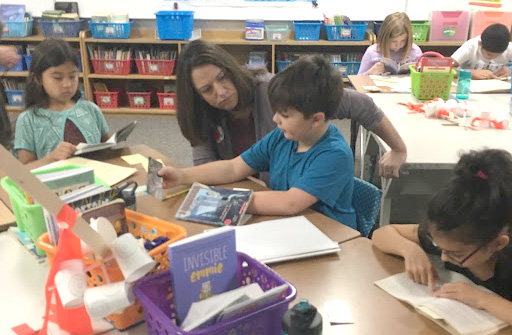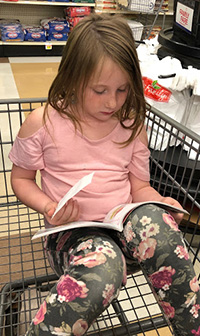January 15, 2019

Early literacy is an ongoing point of concern for our state, but there is something special related to early literacy happening in West and Southwest Michigan. It is called the HIL Project, which stands for High Impact Leadership.
Last year, the United States Department of Education awarded a $12.5 million federal grant to Western Michigan University (WMU). Principal investigator Dr. Patricia Reeves and co-principal investigator Dr. Jianping Shen received funding for the High-Impact Leadership for School Renewal Project over three years. This was the largest research grant ever awarded to WMU and is designed to improve early literacy in Michigan schools.
The funding was awarded to combine the best of WMU’s Educational Leadership Program with West Michigan’s
Reading Now Network and the
General Education Leadership Network (GELN) Essential Practices in Literacy. The great news is that this federal funding has been used to scale up these three leading practices around early literacy all from here within our great state.
This project is focused on improving leadership in school buildings around early literacy. It serves large urban districts like Grand Rapids Public Schools and Kalamazoo Public Schools, and also small rural districts such as Ionia and Vicksburg. In all, 76 individual school buildings are currently being served by this project. They were selected based on current literacy achievement and high poverty rates. All of these schools are located in West and Southwest Michigan because that is where superintendents in 20 counties had previously committed to joining together as “The Reading Now Network.”

The project provides four distinct supports to these 76 high-poverty schools. The first support is providing feedback to schools through instructional rounds. Teams of literacy experts seek to understand the needs of one school building at a time. This is not a one size fits all solution. This is not a curriculum or program that gets adopted. Every building receives an instructional rounds visit, which helps them understand their strengths and weaknesses with respect to the GELN Essential Practices in Literacy, which are the 10 practices that research shows should be happening in every classroom, every day.
I had the pleasure of participating in instructional rounds at Foster Elementary in the Ludington Area School District this school year. The teachers and staff were so welcoming and worked with us as partners as we celebrated their literacy successes. Not only do instructional rounds cause excitement and energy among teachers and staff, but when teachers have an opportunity to observe and interact with their colleagues in a way that is non-evaluative, everyone wins.

The second support provided to schools in the HIL Project is funding. Each school receives approximately $20,000 over two and a half years to implement the work that was identified through the instructional rounds diagnostic visit. As a result of our rounds at Sunset Lake Elementary in Vicksburg, it was determined that we could improve student literacy by providing access to high-interest texts, more diverse texts and inviting, non-leveled book displays. Teachers and students worked together to choose books to purchase with these precious funds.
The third support is a helper, called a facilitator, who is someone who comes to the building once a week to support ongoing efforts and literacy leadership within the school. The facilitators are highly trained, dynamic professionals, many of whom are former teachers and principals.
Professional development is the fourth component of the HIL Project. Summits for teachers and principals, along with other forms of professional learning opportunities, bring the best professional development to these schools related to leadership and literacy.

There are so many success stories directly related to the HIL Project. This particular story really stands out to me, though. This student, seen left, has struggled with reading for two years. Thanks to the new partnership, new training for her teacher, and new books in her classroom that she’s interested in and excited about, she can’t put her book down! This is a child who fought her mom when it was time to read at home. Now, her mom has to fight with her to get her to put her book down when it is time for bed or time to leave the house!
The work of the HIL Project honors and respects teachers and principals. Rather than telling schools what to do and demanding compliance, the project and all of its members “seek first to understand” to come alongside and support schools as a team. The project starts with the assumption that all teachers are working their hardest already and do not need one more accountability measure or to be evaluated into compliance.
The project simply asks, “How can we help you to deeply embed the Essential Practices in Literacy?” and then true to their word, that help is provided.
There are 20 counties working together like never before. This comes from the Reading Now Network. When the project supports the work in a single school, it’s not just Western Michigan University, or one district, or even one ISD working together. Leaders from hundreds of miles away come to support the needs of one individual school building on a regular basis. I have never witnessed collaboration at this level and believe it will lead to great results for our students.
The teachers and principals I know that are involved in this project are embracing the work. It is different than typical school improvement that is so often a compliance measure, but not deeply meaningful. This project is engaging educators as true partners in the improvement of schools, and I believe that this enthusiasm is a sign of great things to come for our students.
I’d like to extend a special thank you to Dr. Kyle Mayer, Assistant Superintendent of Instructional Services at the Ottawa Area ISD, for his work and contributions to the HIL Project, Reading Now Network and the Michigan GELN Early Literacy Task Force.
 Laura Chang is Michigan’s Teacher of the Year for 2018-19, and Meemic is proud to partner with the Michigan Department of Education for the program. Laura is entering her nineteenth year of teaching at Sunset Lake Elementary in Vicksburg Community Schools, where she is currently a K-5 interventionist.
Laura Chang is Michigan’s Teacher of the Year for 2018-19, and Meemic is proud to partner with the Michigan Department of Education for the program. Laura is entering her nineteenth year of teaching at Sunset Lake Elementary in Vicksburg Community Schools, where she is currently a K-5 interventionist.